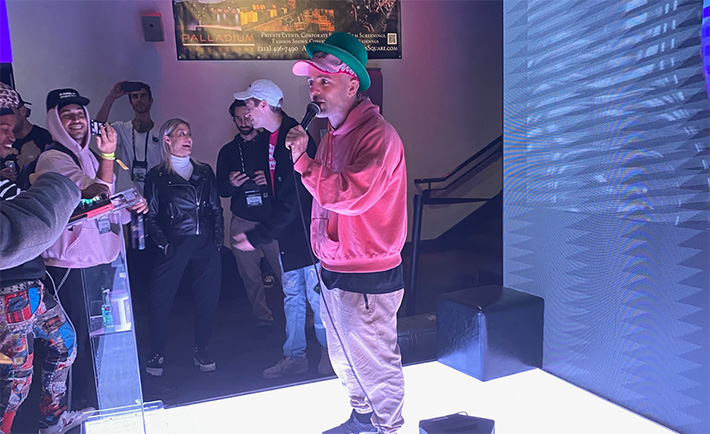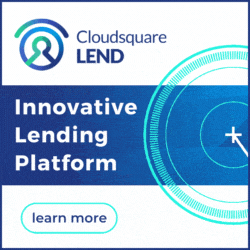cryptocurrency
NFT Owner’s Typo Costs $297K
December 13, 2021It seems the only thing blockchain technology can’t promise is a solution to human error.
The owner of an NFT Bored Ape Yacht Club #3547 got their decimals mixed up on Saturday when they sold the token for 0.75 eth, or 1% of its market value, by mistake. In an attempt to sell the token for 75 eth, or $300,000, the NFT was sold in error to an automated buyer in a call option-like purchase for $3,066, according to CNET.
After the purchase, the buyer dumped ten times the amount paid for the NFT into gas fees to process the transaction instantaneously, a move that prevented any chance of the error being remedied.
“How’d it happen? A lapse of concentration I guess,” the seller of Bored Ape #3547 told CNET. “I list a lot of items every day and just wasn’t paying attention properly. I instantly saw the error as my finger clicked the mouse but a bot sent a transaction with over 8 eth [$34,000] of gas fees so it was instantly sniped before I could click cancel, and just like that, $250k was gone.”
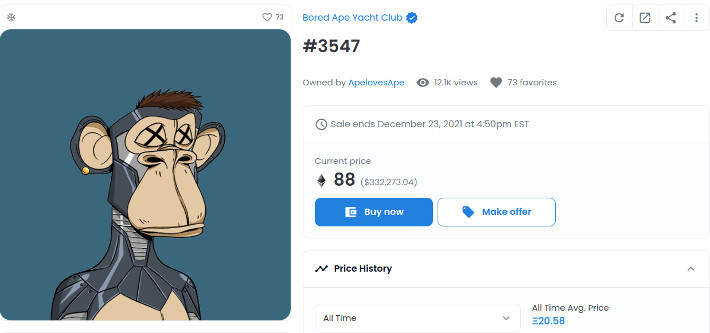
Members of the NFT legal community spoke to deBanked about how this type of stuff is all too common and unfortunate, but just comes with the territory of an unregulated financial space.
“It’s a pretty typical problem here in the Wild West,” said Jacob Martin, an attorney specializing in NFTs and author of the NFT Tax Guide. “It’s user error, not platform error. It sucks, but it is what it is.”
The Bored Ape NFT collection is one of the most sought after collections on the blockchain, with entry level tokens being worth about $200,000. While this error may have been able to be fixed in the world of traditional finance, the unforgiving nature of the blockchain world allows errors like this to be cashed in on by opportunistic purchasers.
Back in August, another Bored Ape was accidentally sold for $26,000. When the seller offered the purchaser almost double that to return the NFT, the new purchaser flipped the token to another user for $150,000.
In November, Cryptopunk #7557 which at the time was worth $19 million, was accidentally listed for $19,000. It immediately sold without remedy for the error.
When asked if regulation would help remedy errors like this in the future, some NFT legal gurus were weary about turning to government for solutions to user-committed blockchain errors.
“I don’t think it’s about regulation, it’s about education,” Shekinah Apedo, an attorney who serves as a Compliance SARs Analyst for Bittrex and NFT legal consultant to numerous companies, told deBanked. “The point of decentralization is that there’s no middleman or institution to run to when an error occurs, like one may do with a typo during a bank transaction. Education is necessary and warnings involving risk should be made known.”
“Cigarettes are legal but they are required to have warning labels,” Apedo continued. “Perhaps, regulation involving warning labels or advertising the risks of being your own bank as an NFT and crypto trader or investor would be good for the mainstream public.”
Q&A with Rachel Sanders on how Small Businesses Can Utilize Blockchain Tech
December 3, 2021 At the NFT BZL conference in Miami on Tuesday, deBanked bumped into Rootine, a vitamin company that is looking to expand into the crypto space. Rootine is a small business that exists fully in the tangible world and sells a tangible product. They offer a completely customized vitamin concoction to their customers via questionnaires that identify biomarkers on their online platform.
At the NFT BZL conference in Miami on Tuesday, deBanked bumped into Rootine, a vitamin company that is looking to expand into the crypto space. Rootine is a small business that exists fully in the tangible world and sells a tangible product. They offer a completely customized vitamin concoction to their customers via questionnaires that identify biomarkers on their online platform.
This all begs the question, how do small businesses like Rootine leverage crypto? Rachel Sanders, CEO and co-founder of Rootine, shared her thoughts.
Q (Adam Zaki)- Your product is obviously inspired by tech and customer experience. Why are these fundamentals of Rootine?
A (Rachel Sanders)- We are in the middle of a health data revolution. More consumers than ever before have access to critical data about their health and this access will only grow. People should be able to leverage their data to optimize their health with precision health products and actionable insights tailored to their unique data and goals. Technology is the key to make this possible.
At Rootine, our mission is to empower members to leverage their data to achieve optimal health and fuel their potential. Rootine analyzes your body to deliver a precision daily multivitamin engineered to optimize your health, and then fine-tunes your formula over time to continuously provide optimal support for your body. Our team has worked hard to build with a human-first mentality, creating a brand that both delights our members and makes a real, and positive impact on their health. We are proud to empower thousands of members to improve their health and are excited to make an even bigger impact in 2022!”
Q-What was Rootine doing at an NFT conference?
A- As the world of web3 and NFTs ballooned in the second half of 2021, we saw a community emerging celebrating vices and fueled by alcohol. There was also this odd dichotomy occurring where health influencers were changing their profile pictures to NFTs depicting un-healthy vices. We believed that heath should be a central part of the conversation in web3, so we dove in.
Rather than build a branded NFT project, we spearheaded a collaborative effort to launch Apex Optimizers, the first NFT project exclusively focused on health and human performance optimization. Community members represent brands like Eight Sleep, Rootine, Hydrant, Span Health, Bioloop, Aloha, Gwella, OneSkin, and Bristle. Early team members from Levels and founders at Bristle, health experts like Louisa Nicole and Dr. Sohaib Imitaz, professional athletes like Justin Gatlin, as well as a number of high performers and crypto and NFT heavy hitters like Steve Aoki.
It has been difficult working in unchartered territory (as a project like this has never been done before), but we were driven by a mission to build an inclusive community highlighting the importance of data-driven health and to deliver tangible real life utility to holders. We have been fortunate to collaborate with some of the top health experts, brands, athletes, and founders in human performance while building a community that is already inspiring its members to improve in areas like sleep, stress, nutrition, fitness, mental health and more.
Q-How will NFTs enhance your product? Why do you think your customers would be more willing to buy products that have some type of blockchain component?
A– As we think about the future of the metaverse, consumer products and brands will play a large role. Exactly what that role looks like is yet to be determined. What we do know is that health will continue to matter and that consumer health brands will need to have a strategy around how they will tie their physical products and experiences into the digital world. As for Rootine, creating a trusted brand and impactful community is always top of mind. To do that, we want to be where our members are and offer unique opportunities that members will not find elsewhere.
One example of that is helping to launch Apex Optimizers. Apex Optimizers is just one of the offerings of the Precision Health Club and it is first and foremost an awesome community of like-minded data-driven health enthusiasts looking to improve how they look, feel, and perform everyday. Gaining access to that community is something Rootine can offer that others cannot, and that is valuable. Through Apex Optimizers we are also able to offer loyal Rootine members access to exclusive perks like 1:1 lessons with pro-athletes, multi-brand discounts and product drops, and real-life wellness experiences.
Q-What are you thoughts on access to capital for small businesses? Has Rootine ever found it difficult to get a loan? Do you think crypto could help the imbalance of access to funds for small businesses?
A- Access to VC capital is a challenge for many. In the VC world, only 2.2% of funding goes to female founded companies, and other minorities and underrepresented founders have similar difficulty. For others, the capital markets have been very founder-friendly recently, with companies raising VC funding at unprecedented valuations.
In the non-VC world, there are a number of new options coming to market that make it easier to get non-dilutive funding. Pipe and Clearco are two great examples. However, to get access to that funding, you have to meet specific size and business model criteria.
Crypto certainly has the ability to put more fundraising power into the hands of creators and builders. There will be more companies using crypto as a way to raise seed capital, and we are already seeing this trend. One thing to note here, is that as the barrier to enter web3 drops, there is going to be more competition for dollars, which will raise the bar on the projects and teams that will succeed in getting funding this way.
Q-Is crypto a topic of conversation in the office? I’m trying to gauge whether your staff has an interest in crypto or if this is just a pure marketing strategy.
A- We have a combination of people very into crypto (e.g. our lead product designer who was an early advocate and continues to be a key thought leader on the team) as well as crypto novices.
It has been exciting to see how the conversations on slack have created an environment of learning and support, helping more people get into the space in a way they are comfortable with. Apex Optimizers’ mission is to make an impact at scale through community, democratizing access to innovation, and by elevating the message around the importance of data-driven health.
For the brands involved, there is of course a marketing component, but at the core, we all came together to help more people live healthier lives because all brands involved support better health.
Q- The crypto space wants to move into the Metaverse. How will Rootine, a company that sells a physical product- vitamins nonetheless- pivot if the crypto community lives in a world where a desire to be healthy may decrease? (If I live in the digital world, with digital art, digital money, digital games, a remote job, and digital friends, why would I want to buy vitamins?)
A- Even if the majority of your life is spent in the digital world, you will still want to feel and perform your best on a daily basis. If people start to neglect health, their productivity decreases, their ability to be their best self at-home with their families and partners decreases, and their stress levels, fatigue and risk for chronic conditions increases. Rootine offers a convenient, at-home way to test your body and get precision multivitamins that can support better overall health, stress levels, energy, focus and more, fueling your potential.
Another interesting thing to note, is if you look at the people building the meta world, a vast majority are the same people who love to compete in athletic feats, biohack their bodies to optimize their productivity, or focus on specific diets. Because of this, health will always be a part of digital communities.
Q- What is the strategy here? Why mint an NFT? Is it to expose the brand? Attract investors? Corner a niche market? Who thought of this, and what’s the end goal?
A-Apex Optimizers’ mission is to make an impact at scale through community, democratizing access to innovation, and by elevating the message around the importance of data-driven health. IJ on the Rootine team originally came up with an idea to explore NFTs and the project has been a collaboration ever since. All people involved have helped shape the design, launch, community and the 30+ perks (and growing) that holders will gain access too.
Q- What is the best way for a small business, regardless of industry, to educate themselves and leverage the crypto market?
A- Get started. If you don’t own an NFT, buy one. Follow web3 twitter and join some discord servers. Research what other brands in your space or adjacent spaces are doing. If specifically looking at NFTs, find whitespace where you can build a unique project that is both collaborative and on-brand
ConstitutionDAO NFTs
November 20, 2021If NFTs can be used to capture a moment or experience, then there should be some already available to showcase the current state of the movement. Here are some that we have found:
So We Didn’t Buy The Constitution
November 18, 2021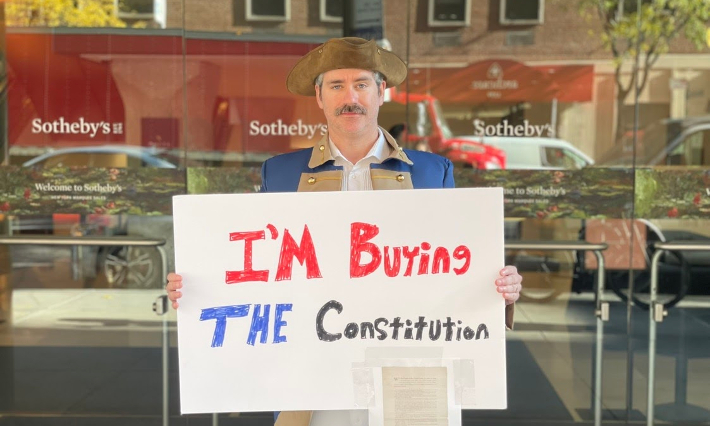 An internet movement started last week to buy one of the only remaining original copies of the United States Constitution reached a roaring climax on Thursday night and then descended into chaos and confusion as almost no one seemed to know what the outcome was, how auctions work, who was bidding on the movement’s behalf, or anything at all.
An internet movement started last week to buy one of the only remaining original copies of the United States Constitution reached a roaring climax on Thursday night and then descended into chaos and confusion as almost no one seemed to know what the outcome was, how auctions work, who was bidding on the movement’s behalf, or anything at all.
Several news outlets reported that the Decentralized Autonomous Organization, aka DAO (pronounced “Dow”), representing the internet movement, had won, including the crypto-focused outlet Coindesk. The DAO raised approximately $47 million via ethereum contributions in a matter of just days from a total of more than 17,437 people who joined in (yours truly included). Knowing that, most people were lured into believing that the winning bid of $43.2 million had to have been the DAO. Unfortunately, the contributors seemed largely unaware of the hefty fees charged on top by Sotheby’s, the 8.875% sales tax, and more. I wrote about this two days prior.
This snafu seems to have been expected by those skeptical of an internet movement. Having actually stood outside of Sotheby’s earlier in the day in full George Washington-esque garb, I was asked by someone seemingly connected to a bidder if the DAO was aware of the added fees. I told them what I knew, but I couldn’t speak in the affirmative for the other 17,436 people.
Having also crossed paths with Julian Weisser, however, a Core team member and nice fellow, it was clear that he was extremely knowledgeable about all the details involved. Weisser was also the first team member to officially announce the loss on the discord.
“@everyone – We did not win the bid for the copy of the U.S. constitution.
While this wasn’t the outcome we hoped for, we still made history tonight with ConstitutionDAO. This is the largest crowdfund for a physical object that we are aware of—crypto or fiat. We are so incredibly grateful to have done this together with you all and are still in shock that we even got this far.
Sotheby’s has never worked with a DAO community before. We broke records for the most money crowdfunded in less than 72 hours. We have educated an entire cohort of people around the world – from museum curators and art directors to our grandmothers asking us what eth is when they read about us in the news – about the possibilities of web3. And, on the flip side, many of you have learned about what it means to steward an asset like the U.S. constitution across museums and collections, or watched an art auction for the first time.
We had 17,437 donors, with a median donation size of $206.26. A significant percentage of these donations came from wallets that were initialized for the first time.
You will be able to get a refund of your pro rata amount (effectively minus gas fees) through Juicebox. Please expect more details from us about this tomorrow – our team has not slept in the past week, and we are giving people the night to get some rest before we’re back at it tomorrow AM.
Every one of you were a part of this. We want to also thank our partners in this work: Alameda Research, Endoament, FTX US, Juicebox, Morning Brew, and SyndicateDAO”
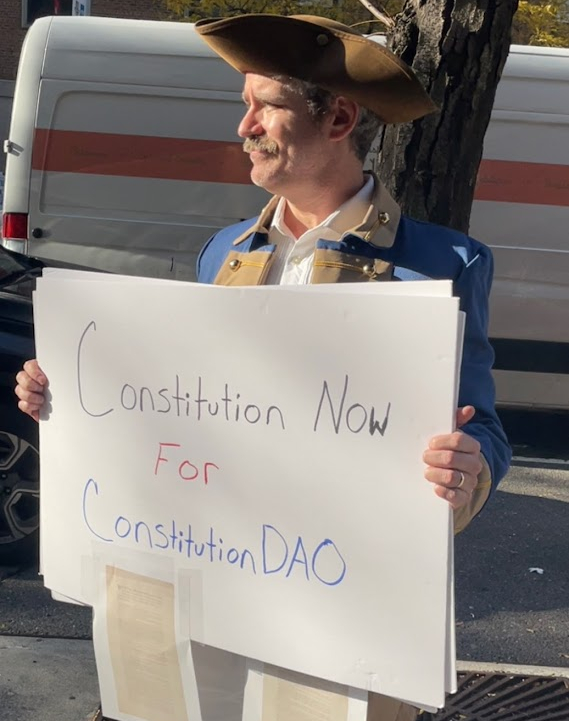 Once the results finally started to kick in, feelings were mixed. Discord members were torn between feeling completely bamboozled or excited to use a DAO to make some other kind of meaningful purchase. The leadership behind the organization’s official twitter account signed off for the night early after working around the clock for about a week to even put the entire thing together.
Once the results finally started to kick in, feelings were mixed. Discord members were torn between feeling completely bamboozled or excited to use a DAO to make some other kind of meaningful purchase. The leadership behind the organization’s official twitter account signed off for the night early after working around the clock for about a week to even put the entire thing together.
gn everyone we’ll be back tomorrow
thanks for all your love and support. can’t wait to shape the next leg of this journey with you all 🙂 🌙 📜 https://t.co/Vhtiglpntg
— ConstitutionDAO (📜, 📜) (@ConstitutionDAO) November 19, 2021
By any measure, the dollars involved were astounding. This particular copy of the Constitution last sold in 1988 for the price of $165,000. Sotheby’s pegged the current value at $15 – $20 million. With $47 million in hand, winning seemed a strong possibility. The one major problem, however, is that with the blockchain being a public ledger, the rival bidder already knew the DAO’s best bid.
Overall, it was a rather strange experience, no doubt made more unusual by my throwing down eth and then donning a costume on the Upper East Side of Manhattan to the bewilderment of many locals.
Was this ultimately a loss for crypto or still a win? Only time will tell…
They’re Actually Going to Buy the Constitution
November 17, 2021 It was Tuesday night in the ConstitutionDAO discord. Users posted the same questions that the mods had answered hundreds of times already.
It was Tuesday night in the ConstitutionDAO discord. Users posted the same questions that the mods had answered hundreds of times already.
“Wen constitution fren?” wrote apelord37.
Another begged the number to hit $6 million already just so they could go to sleep. It was a weak milestone. The earlier thresholds had been more exciting.
“A million, no two million, no THREE MILLION!” the crowd cheered on social media.
But the deadline to reach $20 million, the figure that the auction house had estimated on the high end of what a rare copy of the Constitution of the United States could sell for, was rapidly approaching.
$20 million would be a respectable bid, but it wouldn’t even guarantee a win, and besides that wouldn’t even account for the separate $5 million needed just for auction fees and sales tax. What the DAO really needed was $25 million just to be in the game.
Ouch.
With less than 48 hours to go, hope began to dissipate. A betting site pegged the odds of the DAO actually succeeding at 19%, a discouraging sign.
Just as the people began to pray that Elon Musk might ride in like a white knight, contributors to the DAO awoke Wednesday morning to find that someone had anonymously contributed 1,000 eth to the cause, the equivalent of more than $4 million.
“Holy sh**, this could actually happen,” $people said.
With renewed energy, the DAO reached $20 million by noon and was at $35 million at the time this story is being posted. All of the data is public. A review of it shows that there are more than 11,700 contributors. The top 20 contributors, however, account for more than half of all the funds raised.
On the ConstitutionDAO discord, confidence has surged.
“WAGMI,” one user wrote.
The questions have shifted to what happens if too much is raised and who is going to be hosting parties irl to watch the auction live.
Still others have begun to make other suggestions, like using excess funds for starving children. The crowd isn’t pleased by this, however.
“people, people, focus here, we have only set out to do one thing and that is We’re All Gonna Buy the Constitution,” a user writes.
Crypto Fans Want to Buy The Constitution of the United States and They Might Actually Succeed
November 15, 2021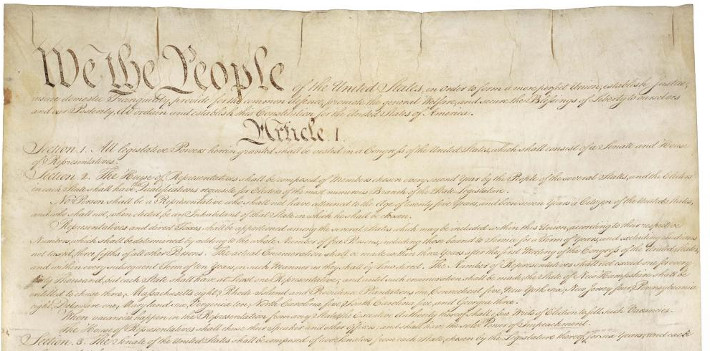
It’s the ultimate NFT, the Constitution of the United States. On November 18th, Sotheby’s will auction off one of the only thirteen surviving copies of the United States Constitution, an opportunity the public hasn’t had since 1988.
But a private collector hoping to pocket the national treasure will have some competition, the crypto mob on twitter. On November 11th, at least two individuals launched @ConstitutionDAO, a twitter account dedicated to crowdfunding crypto with the intent of raising enough money to be the winning bid.
The buyer would technically be a DAO, a Decentralized Autonomous Organization, a community-led entity with no central authority that is governed by a smart contract.
It’s predicted that if the DAO can raise significant cash before the auction that Sotheby’s will allow it to place legitimate bids. Sotheby’s put the estimated winning bid price at $15 million – $20 million.
It might not be out of reach, the DAO raised nearly $2 million in just the few hours since it began crowdfunding the money through a platform called juicebox.
If the DAO wins, theoretically “ownership” of the constitution would be fractionalized into shares based upon each member’s contribution. With a DAO, no one need even disclose who they are. Only a crypto address is required.
We have coordinated a DAO to acquire The Constitution of the United States.
I give you: @ConstitutionDAO
Ping me if interested in being a part of a monumental moment. https://t.co/VHkCTrq4fa
— Austin Cain (📜,📜) (@j_austincain) November 12, 2021
Members contributing to the pool of funds have the option of including a public message.
“To secure the blessings of liberty”
“Another first generation immigrant hoping to be the proud owner of the US constitution.”
“American Dream!!!”
“cant wait to explain this at Thanksgiving”
“in satoshi we trust”
The official website of the ConstitutionDAO is here.
For the sake of following the success or failure of this project accurately, deBanked contributed a very small amount to the DAO so that it could participate in the possible ownership and community of the Constitution. Weird, I know.
Blockchain Expert says Crypto Tools will Revolutionize Lending
November 11, 2021 Blockchain technology can seem complex, but many individuals operating companies that utilize the technology are planning for their world to collide with mainstream finance very soon. Mark Shekleton, CEO of Smart Seal, a company that provides digital identifications for physical goods, believes that those in fintech and small business lending will utilize the technology that blockchains offer on a daily basis in the near future. The technology that will be most useful according to Shekleton, is a type of token he refers to as an (non-transferable token) NTT.
Blockchain technology can seem complex, but many individuals operating companies that utilize the technology are planning for their world to collide with mainstream finance very soon. Mark Shekleton, CEO of Smart Seal, a company that provides digital identifications for physical goods, believes that those in fintech and small business lending will utilize the technology that blockchains offer on a daily basis in the near future. The technology that will be most useful according to Shekleton, is a type of token he refers to as an (non-transferable token) NTT.
“When I’m talking about NTTs, I’m talking about a token that is like an NFT, but it can’t be transferred. It’s issued against a wallet and it can be revoked from that wallet by the issuer,” said Shekleton.
“By issuing NTTs, you allow [merchants] operating in the crypto space to gain reputation and credit for the activity they do under that wallet. So if I am operating a business, and I’m using a crypto wallet to operate, and I borrow some money, and I pay it back, the lender can issue me a positive credit report; a positive token. A token that symbolizes a positive [payment history].”
This token, issued as a one-way NFT, would be a permanent record on an objective platform that could be referenced by anyone who is looking to view the credit history of a specific merchant.
“If I go to another lender [as a merchant], they can look at all of these NTTs that are issued against my wallet and they can say ‘hey look, we saw this other lender issue one of these tokens’, [thus] you paid back your loan, and have this positive piece of reputation associated with your wallet.”
“As you go, the level of trust around a certain wallet increases. If you operate your business, and you can demonstrate that you are trustworthy, and you have people who are issuing these tokens in your wallet, you can prove to anyone else that you are a trustworthy business.”
Shekleton expanded his ideas of potential uses for blockchain technology into identity verification as well. He explained how the same process used for credit history for merchants can be used for individuals or businesses when trying to prove who they are virtually.
“Companies or banks that have services where they’re verifying the identifying of online customers, there’s a really good opportunity here for (Know Your Customer) KYC companies to issue identity tokens,” said Shekleton.
“Say I have a wallet. And right now I created a new wallet, it’s completely anonymous, I’ve never associated my identity with it. But I want to use that wallet to borrow money. I want to make sure there’s no money laundering, the lender needs to know my identity. I go to a KYC issuer, I upload my ID, meet all my requirements to verify my ID, and I sign with the wallet to prove that I’m the holder of this wallet. Then, they issue an identity token, and I can’t transfer that token to anyone else’s wallet, it can only stay in my wallet.”
According to Shekleton, an NTT’s ability to be revoked by the issuer makes it a great way to counteract fraud or identity theft, as the authenticity of the token can be revoked at any time, making the token visibly unusable to all who attempt to use it fraudulently. When asked why this idea hasn’t caught on, and why he referred to NTTs as “not talked about, and complex” at NFT.NYC last week, he blamed the infancy of NFTs and how NTTs are just too new to be widespread.
“The technology itself is just in its infancy. I think there’s a huge opportunity here, virtually untapped, but it’s still very young so it’s going to be a couple of years before anyone realizes the gains of this tech if you start building it now. I think when you start talking about NFTs as utilities to fintech and lending companies, I just don’t think they are awake to that yet. They haven’t started building.”
NYC Rapper’s Experience With Fat Joe is Becoming an NFT
November 5, 2021Rami Even-Esh, better known by his rap name Kosha Dillz, went viral last week after hip-hop artist Fat Joe joined him in his ritual of rapping for Knicks fans outside of Madison Square Garden before and after home games. When Fat Joe approached him while he was rapping, Even-Esh’s life changing moment spiraled into a world of opportunities. Now, he’s trying to turn a once in a lifetime experience, along with other highlights from his life, into NFTs.
Even-Esh spoke with deBanked at NFT.NYC on Wednesday about his performance at the event, after he just showed up and was given a stage—subsequently stealing the crowd away from the speaker’s showcase in the next room, and towards his crypto-inspired rhymes.
“Fat Joe heard me rapping on the beat, got on the mic, and tipped me twenty bucks,” said Even-Esh, when describing the incident he wishes to mint. “He got on the mic and spit a verse that I knew word for word, from Big L’s ‘Enemy’, it’s a very classic song. That went to one page, then it went to another page, and then that was it. Game over. You know, we probably hit about nine million views and now more people are posting it.”
After the iconic moment outside of Madison Square Garden, Even-Esh immediately hopped on a flight to Colorado to try and make another connection with Fat Joe during one of his shows there.
“I showed up on my own flight, and went there unannounced. Then he saw me, embraced me, there were bunch of cameras around us. Fat Joe sent his people to bring me backstage, they interviewed me, and then they said man, we’re going to put you on stage.”
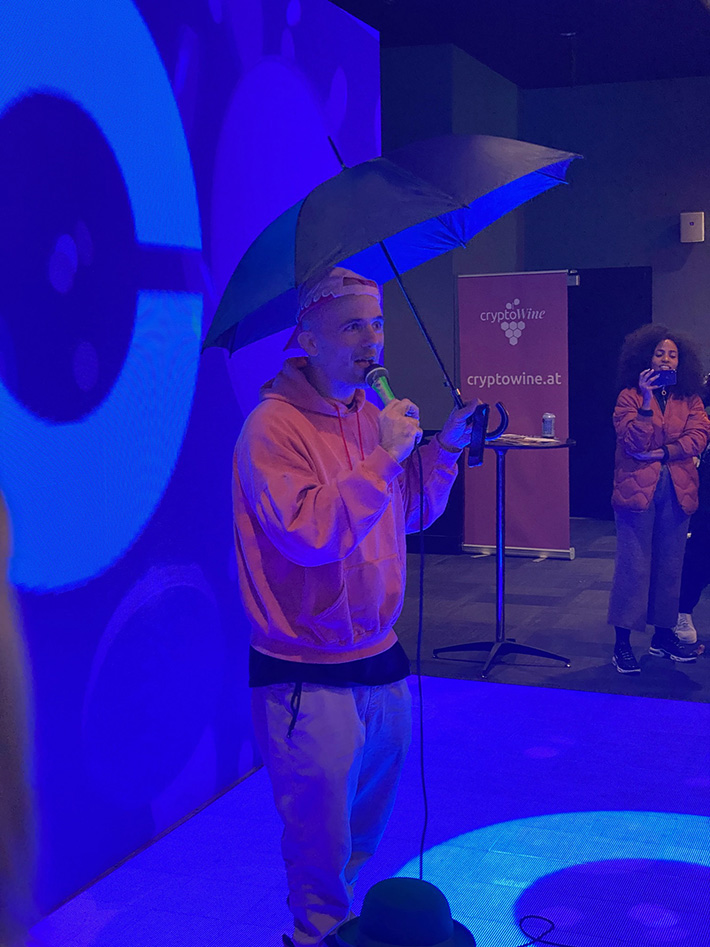 “That’s when I told Fat Joe, I said, my whole life is changing man, we should make this into an NFT.”
“That’s when I told Fat Joe, I said, my whole life is changing man, we should make this into an NFT.”
Even-Esh has had impressive bouts in the music industry prior to this event, which are what he hopes to build upon when he mints NFTs out of his experiences. His website mentions collaborations with rappers like Matisyahu and Rza, and even a tour with Wu Tang Clan. According to Spotify, Kosha Dillz has almost 16,000 monthly listeners on their platform.
Even-Esh has long taken interest in the crypto space, and talked extensively about what NFTs and blockchain technology mean to communities like his who are trying to make a name for themselves while also trying to pay their bills.
“With NFTs, you can mint a moment. There’s so much stuff that happens. That could be a whole series of NFTs, moments that weren’t documented that offend people, or moments of people [that are] in trouble, that could be a thing,” said Even-Esh.
“Moments where great rap music happened but no one ever saw— these could be NFTs.”
Even-Esh appears to be hoping to turn these his minted life experiences into a revenue stream. He claims that all of the places he has been to along with the people he has met create value for potential buyers. “I’m looking to mint more of my experiences because I think my experiences are gold. I have golden life experience.”
Whether it is the NFTs or his music that takes off, the exposure that the moment with Fat Joe gave Even-Esh has set his life on a new path.
He shared his advice to others after appearing to be inspired by the publicity he has received. “Someone told me there’s a million dollars out there for everybody. You have to seek it, go out, and find it.”
The timetable on the minting of his experiences is still undetermined, but that is only because of the amount of attention he has gotten, and the more opportunities that have come his way.
“I’ve been approached by a lot of record deals. Lawyers, agents, major companies, you know that’s what I’m trying to do, investors to take my thing to the next level and sell my story. My job is to tell my story.”


